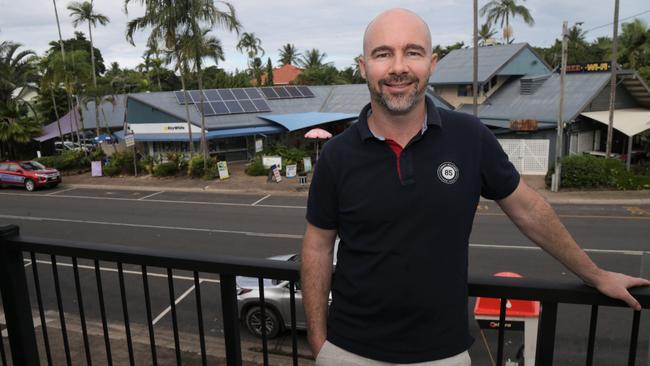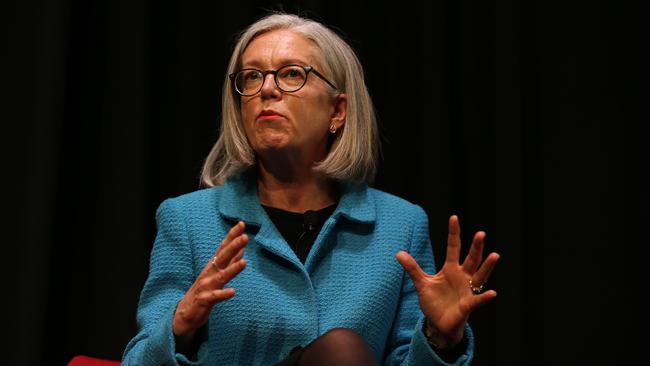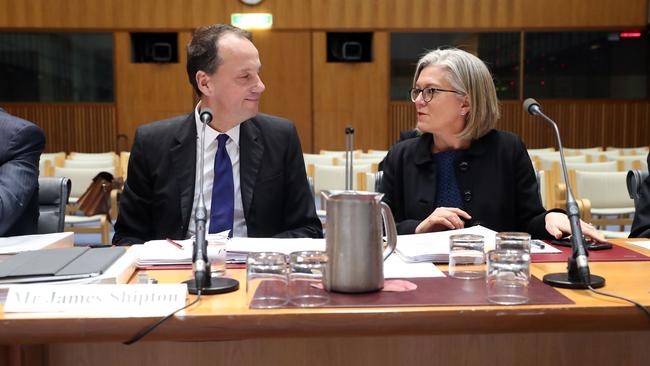Short-seller John Hempton’s ASIC links in focus in Mayfair 101 court case
Looming court action between ASIC and Mayfair 101 has revealed thousands of messages between short-seller John Hempton and ASIC deputy chair Karen Chester.

A close friendship between Bronte Capital short-seller John Hempton and ASIC deputy chair Karen Chester is set to be scrutinised at the rerun of the courtroom fight with Mayfair 101 boss James Mawhinney in December.
Mr Hempton, who runs asset manager Bronte Capital from its office in Sydney’s Eastern Suburbs, has taken credit for tipping off ASIC about Mayfair, triggering the intervention in the investment operation which at its peak laid claim to an island and hundreds of homes in Queensland’s Mission Beach.
In one tweet Mr Hempton tells Mr Mawhinney: “I took your materials and sent it to ASIC.
“If you go to prison I will visit.
“Yes I turned you into ASIC. They acted slowly. It would have been better had they had no investors.”
ASIC insists it was already keeping a close watch on Mayfair, with tip-offs from concerned market watchers before Mr Hempton added a warning about the firm in an email to Ms Chester about Phil King’s Regal Funds Management.
But the speed with which ASIC moved, with ASIC moving the morning after Ms Chester was contacted by Mr Hempton, may haunt the regulator in the rerun of its case with Mr Mawhinney, as ASIC contemplates pushing for a new 20-year ban. Mr Mawhinney has mobilised ahead of his court fight in December, in a bid to overturn the interim restrictions on attempting to raise funds.
He has launched a defamation action against ASIC’s deputy chair Sarah Court, as well as lodging a concerns notice against Ms Chester.
He has even personally handed a letter to Assistant Treasurer Stephen Jones at a Wollongong Coles to raise his concerns.

But Mr Mawhinney faces an uphill battle, with the Federal Court finding only one of the 29 grounds put forward entitled him to an appeal.
The full bench found ASIC had not sought certain findings of contraventions made by Justice Anderson, who slapped Mr Mawhinney with a 20-year-restraint on advertising investments and raising funds, in a scathing judgment.
The Federal Court first hit Mr Mawhinney with the restraints in April 2021 after Justice David Anderson found he had engaged in “serious, incompetent and reckless” conduct.
On appeal the court reinstated the interim bans on spruiking financial products, pending a final outcome.
Mayfair views Mr Hempton as the key instigator of ASIC’s action, while the regulator has rubbished this, claiming it was looking into the group well before Mr Hempton’s involvement.
ASIC made its first formal move in December 2019, when it demanded Mayfair and its associated trustee Quattro Capital hand over documents, but the wheels were already in motion.
Mr Hempton told The Australian he emailed Ms Chester, his former supervisor at Treasury, on the evening of November 27, highlighting his concerns with Mayfair, telling her the company’s advertising “has a deep smell of BS” and noting “my spidey-sense is going off badly on this”.
“My parents in law – 80 years old in Mildura – were going to put some money with them. This seems far less sensible to me,” he wrote.
“The links to IPO Wealth (a likely ponzi) and to the Public Listing Company (which does shell games in penny stocks) is too ugly for words.”
On the morning of the November 28, after Mr Hempton wrote to Ms Chester, a senior manager in ASIC’s investment managers team, responding to a forwarded email which noted to “treat as in confidence”, told other staff they were “thinking about a consumer warning” about Mayfair, noting they are “confirming we are making inquiries into it given the marketing”.
Documents show four hours later ASIC’s then head of investment managers, Rhys Bollen, responded to the senior manager, telling them he was “thinking of something like WARNING – MAYFAIR 101” using the new powers that had been handed to ASIC to issue public warnings over investment products.
Four days later, on December 2, a message went out from an ASIC investment managers specialist, saying “pressure is on to do something”.
Days later ASIC demanded Mayfair and Quatro hand over documents, promotional materials and bank statements.
Mayfair learned on January 29, after the regulator’s staff returned from the summer shutdown, that ASIC had moved to commence a formal investigation, with Vasco Trustees’ managing director warning Mr Mawhinney he had been told to “attend a meeting with about six people from ASIC today to discuss IPO Wealth and Mayfair”.

Several former ASIC figures have confirmed to The Australian they were concerned over the speed with which the Mayfair investigation was expected to be carried out.
The six-month turnaround from reports to action raised eyebrows within the ASIC executive after Ms Chester, who joined the regulator in December 2018 after missing out on the top job at the Productivity Commission, took up the issue despite enforcement falling under the purview of the office of enforcement.
The Australian understands ASIC’s then chair James Shipton was not aware of why Ms Chester had a keen interest in the Mayfair matter, nor the degree of her association with Mr Hempton.
Mr Hempton told The Australian he had sent a large number of WhatsApp messages to Ms Chester over the year, but more recently she had stopped responding to him.
“She cut off communication. I haven’t heard from her,” he said.
“She doesn’t reply to my emails, but I continue to send her the odd fraud, I sent her a fund manager I think is a fraud.”
The Australian understands Ms Chester has told ASIC that Mr Hempton emailed her three times on her personal email account around mid-2021, but that these messages were not in relation to regulatory action.
ASIC declined to comment on several WhatsApp messages sent by Mr Hempton to Ms Chester, but The Australian understands the deputy chair reported three messages from her former colleague on WhatsApp from about the beginning of 2022.
These messages, according to ASIC sources, were forwarded to the regulator’s general counsel Chris Savundra, who then passed them on to “relevant ASIC staff” to be recorded as misconduct reports.
In a recent hearing, Senator Andrew Bragg questioned ASIC over the use of personal phones by staff for conducting commission business.
In a response to a question on notice, ASIC said it didn’t restrict staff from using personal devices when making calls or sending messages, but noted it’s device policy “places a positive obligation on staff to consider the nature of the information, the way information will be transmitted, how it will be stored, and the recipients’ need to know”.
Mr Hempton has been a critic of ASIC, and in an interview with the Financial Review in mid-2021 he criticised Joe Longo, the incoming chair.
“I don’t know anything about Joe Longo,” he told the AFR, taking aim at the incoming ASIC chair over his former role at Deutsche Bank, which he branded a “cesspit walking from one investment banking fraud to another”.

“The only real support for this I can find comes from James Mawhinney from the collapsed and questionable Mayfair Platinum, who thinks this appointment is great news. That said, the appointment is made and many a poacher turns gamekeeper to great effect. I have my fingers crossed.”
But Mr Hempton has also helped ASIC, as a confidant in the regulator’s market surveillance activities and running training sessions for staff on three occasions.
An ASIC spokesman said Mr Hempton “offered to conduct training for ASIC staff and that offer was referred by Deputy Chair Chester to the appropriate ASIC executive”.
“Subsequently, ASIC staff accepted Mr Hempton’s offer to conduct staff training, that training was organised by ASIC staff, and was provided free of charge to ASIC,” he said.
Sources close to former ASIC figures said the regulator’s leaders were uncomfortable with Mr Hempton conducting training sessions from the regulator’s Sydney offices. The Australian is aware several executives expressed concern Mr Hempton, a high-profile short seller, would be meeting with members of the agency that regulates short selling.
Ms Chester has taken the lead on several ASIC priorities, including its pursuit of Isignthis and its boss John Karantzis, as well as more recently a crackdown on insurers failing to keep pricing promises to customers.
However, the approach has raised eyebrows of those familiar with Ms Chester’s 2015 review of ASIC, in which she warned commissioners should be “separated from operational decision making and execution activities, thus avoiding potential conflicted interests and ensuring whole of entity objectivity”.
Her relationship with other staff of the regulator has at times been testy, and her joining ASIC in 2018 came as a surprise – without consultation with Mr Shipton.
The relationship between the two, while robust, deteriorated after Mr Shipton took a leave of absence from ASIC in 2020 after an inquiry into a $118,557 tax advice bill from KPMG for tax advice for the chair. A review into Mr Shipton and his deputy Daniel Crennan made no adverse findings into the two.
Ms Chester faced a bullying investigation in 2021 after Mr Shipton returned to the commission, with multiple members of ASIC’s leadership raising concerns over her behaviour.
Ms Chester had been acting chair of ASIC during the period Mr Shipton was on leave.
Treasurer Jim Chalmers blocked the release of the findings into Ms Chester, but parliamentary sources said that in an in-camera briefing, Treasury told the Senate economics committee a number of findings about Ms Chester’s conduct had been substantiated but she could not be removed except by order of the Governor-General.
An ASIC spokesman said the questions posed by The Australian “made serious conduct allegations about Deputy Chair Karen Chester”. “The basis of those allegations is not clear from your email, nor is the basis clear to ASIC after internal inquiries,” he said.






